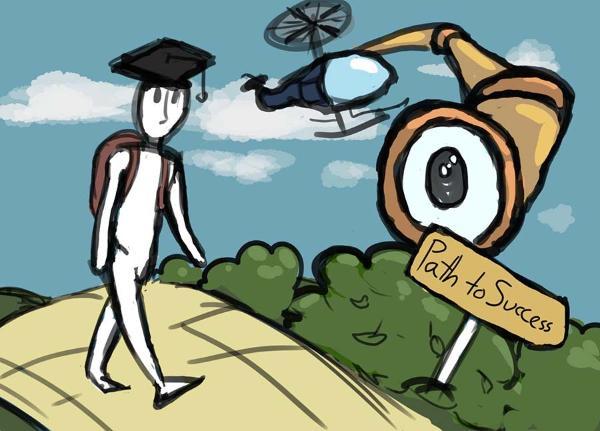Helicopter Parenting: Parental Concerns as High as the Sky
by Jacob Savoie-Foster
Our parents—whether we love them or dislike them—play a significant role in our lives; I don’t think that that’s a surprise. College can be liberating for students, as it allows them to grow, to learn, to become independent. Understandably, watching their children leave for college can be sad, especially if the child-in-question is an only child or the youngest. It isn’t impossible for this to push some parents to follow their children closely throughout their child’s college career.

Illustration by Daeg Hamilton
You’ve heard the term before: “Helicopter Parents.” These parents can be described as those who don’t want—or don’t know how to—stay out of their child’s personal space and business. Being totally enveloped in a child’s business and life can manifest in many ways, but some of those ways that’re part of what makes a helicopter parent a helicopter parent are, but not limited to: spoiling the child, watchdogging, and germaphobia, just to name a few, although germaphobia is quite a rare attribute for helicopter parents. It could be argued that all parents do these things, but they know when to check themselves on these and they know when to hold back. If you’re unaware, this can look relatively harmless, but psychological evidence points to a different conclusion entirely, and that helicopter parenting can affect children in a myriad of ways. The worst part of it is that people on the outside watching the helicopter parenting unfold can’t really say anything to either the parent or the child-in-question. There’s no easy way to go about it.
The popular Psychology Today published an article on a study done where students and parents were invited to complete puzzles in a ten-minute period. Psychologists who were present for this experiment told the parents of the children that they were allowed to help their children but were not encouraged. These puzzles were made to have the same infuriating nature of homework. The study found that parents of children with more social anxiety touched the puzzles more than children without social anxiety. Parents who did this even stepped in to help their children when the children didn’t seek any help.
“This suggests that parents of socially anxious children may perceive challenges as more threatening than the children perceive them,” the article reads, and goes on to state that “[O]ver time, this can erode a child’s ability to succeed on their own.”
If this is indeed the case, then it means that this kind of overwatch can be detrimental to the child over time, while in the moment, it seems like the parent is helping the child.
The website Big Think published an infographic with a barraging amount of information on the negative effects on helicopter parenting. While most of the information found is the same as the data gathered in the study cited by Psychology Today, Big Think also notes that helicopter parenting can increase a child’s chances of developing depression, to seek out harmful habits like smoking and binge drinking, being unable to making goal-oriented decisions by themselves, etc. In the case of community college students, where most—if not all—students commute and live at home with their parents, this allots the parents more time to spend hovering over their children, and exceptionally exacerbating the problem for the child.
Good ways of establishing balance—on the part of the parents—is to leave things as they are instead of fixing them, even if they’re able to fix it, letting the kids fail (so that they can learn, not suffer), etc.
Ultimately, one reality that we must all face is that our parents aren’t going to be around forever. My mom babied me since I was young, and I’ll be honest, she was a helicopter parent. Losing her made the transition from childhood to adulthood super hard and super quick. Most kids, who aren’t under the fist of their parents, have plenty of time to grow up and mature. Parents must understand this, too, and create their boundaries around their children as such. Boundaries for the child need to be balanced between discipline and freedom, so that when the time comes, the child can move beyond the bubble that the parent(s) have set up around them. This is integral if children hope to become independent. Of course, this does not mean that children don’t have to remain in contact with their parents when they go away to college—community college or university—it just means that a balance must be reached with contact, too.
Categories: Featured, Around Campus, People, Student Life